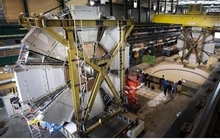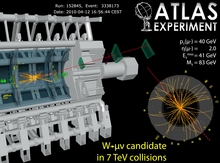Research Interests:
ATLAS Experiment at CERN and experimental high energy physics
My group focuses on the ATLAS Experiment at CERN. The ATLAS experiment is a large detector system developed by a collaboration of physicists from around the world to study very-high-energy proton-proton interactions. This experiment probes the origins of electroweak symmetry breaking and the particles associated with new physics. These discoveries will improve our understanding of the fundamental particles and their interactions, and also of the nature of the early universe.
Selected Publications:
"Measurement of the production cross-section of a single top quark in association with a Z boson in proton-proton collisions at 13 TeV with the ATLAS detector" , arXiV:1710.03659
"Observation of a new particle in the search for the Standard Model Higgs boson with the ATLAS detector at the LHC", The ATLAS Collaboration, Phys. Lett. B 716 (2012)
"Dynamical Electroweak Symmetry Breaking Review"; K. Black, M. Narain, and S Chivukula, Particle Data Group (2017)
"Evidence for the Higgs-boson Yukawa coupling to tau leptons with the ATLAS detector", The ATLAS Collaboration, JHEP (2015) 117
"Performance of the ATLAS muon trigger in pp collisions at sqrt(s) =8 TeV, The ATLAS Collaboration", Eur. Phys. J. C (2015) 75: 120
"Search for pair and single production of new heavy quarks that decay to a Z boson and a third-generation quark in pp collisions at sqrt(s)=8 TeV with the ATLAS detector", The ATLAS Collaboration, JHEP 11 (2014) 104
For a full list of publications, please see the attached CV.
Education:
- Ph.D. Boston University
- B.A. Wesleyan University
Biography:
Kevin Black received his Ph.D. in experimental high energy physics from Boston University in 2005. His work there focused on a measurement of the top quark mass and development of the D0 trigger system. His post-doctoral research at Harvard University focused on direct searches for new phenomena at the ATLAS experiment at the CERN Large Hadron Collider. He has also extensively worked on the software to reconstruct events with the large and complex ATLAS detector. He is an author of numerous publications in refereed journals and is actively involved in the extraction of first physics results from ATLAS using early LHC data.
Associate Professor, BU
In the news:
- Kevin Black named US ATLAS Scholar
- CERN experiments observe particle consistent with long-sought Higgs boson
- Lane, Bose, Black referenced in Daily Free Press
Research Descriptions:
The ATLAS Experiment at CERN
The ATLAS experiment is a large detector system developed by a collaboration of physicists from around the world to study very-high-energy proton-proton interactions at the Large Hadron Collider (LHC) at CERN, a laboratory for high energy physics near Geneva, Switzerland. Boston University personnel were involved in the construction and installation of the muon detectors for ATLAS. The detectors occupy a region the size of a five-story building and measure the trajectories of muons in a magnetic field with a precision of better than 1/10 of a millimeter. This permits precise determination of the muon momentum which is an important ingredient in searches for new phenomena at the TeV energy scale. Boston University has also played a leading role in the development of computing and analysis tools.
 Physics (Internal)
Physics (Internal)


